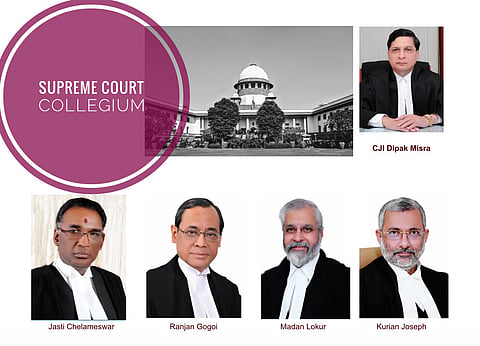
- News
- Columns
- Interviews
- Law Firms
- Apprentice Lawyer
- Legal Jobs
- हिंदी
- ಕನ್ನಡ

The clamour for transparency in judicial appointments reached fever pitch this past week, prompted by the proposed transfer of Justice Jayant Patel and his subsequent resignation. And now, TOI reports that the Supreme Court Collegium has resolved to formulate norms which determine the way judges are appointed to the higher judiciary.
The report suggests that the Collegium headed by Chief Justice of India Dipak Misra unanimously took a decision to lay down a procedure in order to circumvent arbitrary decisions while elevating and transferring judges. One of the members was quoted as saying,
“Churning is on. You will soon find a procedure guiding the selection of persons for appointment as judges of constitutional courts.”
Apart from CJI Misra, Justices J Chelameswar, Ranjan Gogoi, Madan B Lokur and Kurian Joseph are the other members of the body that determines appointments to the higher judiciary.
This is not the first time the Supreme Court has ventured to attain a semblance of transparency in the system. After the 2015 NJAC verdict, the idea of having a secretariat in the Supreme Court and the High Courts was floated. And now, the report suggests that the Collegium is close to giving effect to this suggestion. The secretariat will collate data on the track record of persons being considered for appointment as judges and place it before the Collegium.
The Centre and the Supreme Court have failed to see eye to eye on the Memorandum of Procedure, a document that would determine the way appointments are made. In March this year, the Collegium headed by former CJI JS Khehar had rejected the clauses relating to national security and the permanent secretariat proposed by the Centre.
Then, after Justice Karnan fiasco, the Court highlighted a need to revisit the process by which appointments are made. Justices Chelameswar and Gogoi in their judgment had stated,
“This case, in our opinion, has importance extending beyond the immediate problem. This case highlights two things, (1) the need to revisit the process of selection and appointment of judges to the constitutional courts, for that matter any member of the judiciary at all levels; and (2) the need to set up appropriate legal regime to deal with situations where the conduct of a Judge of a constitutional court requires corrective measures – other than impeachment – to be taken.”
And now it seems that these judges – both members of the current Collegium – are keen on putting their words into practice. Apart from setting up the secretariat, it remains to be seen what other steps the Collegium will take in order to lift the veil over what has thus far been a largely opaque process.